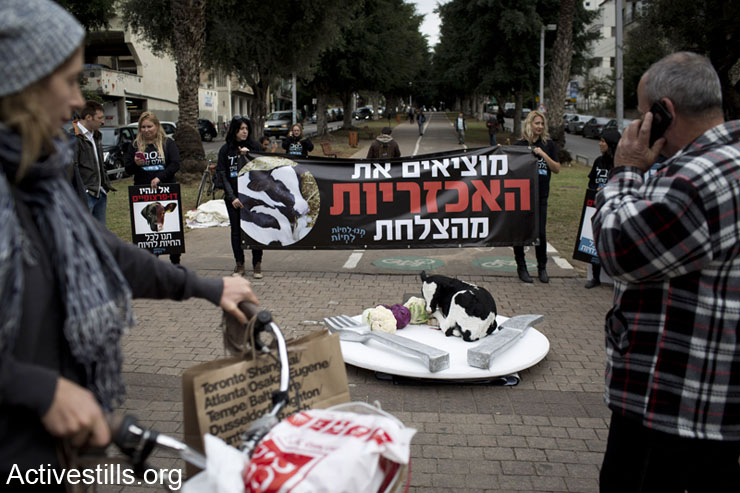An invitation to visit the site slated for Palestine’s first vegan cafeteria led me to discover the buzzing, if incipient, world of animal rights activism in the West Bank.
I have a confession to make: I, how shall I put this, don’t like animals. Whether it’s the annoying dog wagging his tail next to me on the street or the cute spoiled cat seeking an embrace, they just don’t do it for me.
I tried to learn the code of acceptable conduct among pets’ adoptive families, though I always managed to fail by offending someone. Most of the time I extracted myself from the embarrassment through joking, “C’mon I’m an Arab, you know, for us a dog is a dog, and family is family.” I’m also neither a vegetarian nor a vegan, but don’t really like meat and can get along very well without it for several days.
I was approached by a group of young Palestinian women attempting to open the first vegan cafeteria in Palestine at Al Quds University in Abu Dis, Jerusalem. They’re seeking public aid to realize their dream of helping animals survive in Palestine, educating youth about animal rights, and supporting disadvantaged students at the university. The goal is to employ single mothers from Abu Dis to cook with Palestinian ingredients from Palestinian farmers, without any Israeli products.
Parting Waze
This is too good to be true, I said to myself. Why would anyone care about Palestinian animal rights when Palestinian people see their rights violated on a daily basis?
I decided to see for myself, and took Waze along with me to the Al Quds campus. After an hour on hilly roads the app declared confidently: “You’ve reached your destination.” I got out of the car and found myself facing a particularly tall fence. That’s no university!
I approached a teenage passerby and asked: “Where is the university?”
“The Hebrew University?” He asked.
“No, not the Hebrew University. Al Quds. Waze says it’s here.”
He laughed out loud. “Yes, it’s here, just behind this fence. Do you have a helicopter? If you go down this road you’ll reach a settlement, but the road is blocked. You’ll have to go back up through Abu Tor, then go down the Maaleh Adumim-Jericho road to Eizariya, and then back to the university. What, you’re not from here?”
I pretended to understand his directions and set off to find Palestine’s first vegan cafeteria.
On a side road, I stopped by an old decrepit man who was negotiating a steep upward slope while carrying a lot of bags and looking like he was about to collapse. I asked him where the university was.
“No, not the Hebrew University,” I said before he had a chance to ask.
“Oh dear, it’s far away. How did you end up here?” Before I knew it, he filled the inside of my car with an odor that was a mixture of fruits and vegetables and male sweat. He told me how the fence has encroached on their lives, and how public transport doesn’t go anywhere anymore. I dropped him off after a while, and then he directed me to a roundabout that would lead me to the checkpoint to Jericho, and then at some point make a right to Abu Dis.
I parted from Waze and from the fragrant gentleman and drove off. I tried to call my host, Sameh Erekat, the coordinator of student volunteering, but there was no reception, of course. I asked around until I finally reached the campus.
Breaking the cycle of violence
Mr Erekat was waiting for me, embarrassed, as if he knew what I had gone through even before I said a word. “I’m really sorry you were stranded like that,” he said. “I really appreciate your coming here. I didn’t expect you to make it!”
“Neither did I,” I said after a two-hour journey that was supposed to be no more than 50 minutes.
We walked over to the building where the cafeteria was slated to open, where we met four sweet teenagers from the Ramallah branch of the Palestine Animal League and three guides who were sitting outside.

Ahmad Safi, a PAL employee, gave us a presentation about their work. I was amazed by the amount of knowledge he had on animals in Palestine. He told us about their rescue operation to save animals from Gaza’s Khan Younis zoo who hadn’t eaten for 52 days during the 2014 Gaza War, and on treating working animals: the volunteers go to villages where donkeys and horses work the land, vaccinate them and instruct the owners about treating them respectfully.
They also have a campaign to raise awareness among children about their pets.
“We have to break the cycle of violence,” he said. “We have to tell these kids that what they see the occupation doing – killings, incursions and raids into their villages and schools – is not a natural reality. This violence eventually comes out on defenseless animals, and kids think it’s all right because violence is king. Everybody harms the weaker, and animals are an easy target.”
“We try to convey to them that we are all living creatures, and we all have feelings – animals and human beings alike, “Sham, a volunteer, explains. “The same way we fear a tank or an armed soldier, they do too. We are under the occupation together, and therefore should help every living creature.”
“It says so in the Qura,” Jiwa adds.
Our ancestors didn’t eat meat
I ask them whether they are vegan – khudaryat, in Arabic, meaning “herbivores.”
“Sort of,” says Siham. “I barely eat meat. Since I became involved in this I noticed I don’t like the taste that much.”
“I am vegetarian,” says Dana. “I gradually stopped eating murdered stuff, I can’t put in my mouth something that was once living.
Sham says she does not proselytize or try to enforce anything on her family. “Palestinian cooking has so many vegetables. Even if they eat meat and I eat salad and rice, I’m happy.”
“So many vegetables, yes,” adds Jiwa. “And how can you open a cafeteria without falafel? It has all the iron and protein that you need. Who needs shawarma?”
“But meat is a requirement at any special meal,” I say. “Look at the iftar meal after Ramadan. Is there an Arab dinner party anywhere that doesn’t have meat?”
“That’s right, Safi says. “We were taught meat was prestigious. But what did our ancestors eat? Plants and vegetables. They ate meat only once a week because they couldn’t afford it. Meat-eaters were considered the rich ones, that’s why it took over our diet. The meat industry here uses hormones profusely, we learned that from Israel. The owner of one of the biggest chicken farms in Palestine said that he learned from Israelis how to feed his chickens a mixture of chicken meat leftovers, intestines, hormones, antibiotics and some seeds, instead of the regular food, to make them fat quickly, and cash in on it. Since when did Palestinian farmers start growing chickens like that? It’s all about the money. Jews and Palestinians want to be as rich as they can.”
“You said you wanted to be part of the boycott Israel movement. If you want to be vegan, that’s fine. What’s the boycott got to do with it?”
“We see the occupation as the bane of the Palestinian people and animals alike,” says the guide. “A Dutch company provides attack dogs to the Israeli army, to be used against Palestinian women and children in checkpoints and during raids, and we can’t be expected to be silent. We joined hands with the BDS movement and stopped the supply of the dogs. It’s a flagrant exploitation of the animals and a terrible affront to Palestinian human rights.
“What about medicines, vaccines, medical equipment? It’s got to be Israeli, you can’t be saying that the Palestinian Authority supports you?”
“You’re right, there are some ingredients that Israel prevents us from importing or producing,” he said. “Israel is the only source for those, and some of these chemical elements are banned from Palestine because they can allegedly be used for terrorist activity. That’s how Israel controls the industry. We learned to make some of the medicines ourselves, and we ship some of the ingredients over from England and cook them manually. But no, we don’t get any support from the PA. About one percent of its budget goes to agriculture, so just imagine how much of that is allocated to animal protection.”
“On the other hand,” he adds, we have lots of support from the local government – municipal inspectors helping us catch animals with no extra charge. Even the space for the cafeteria, worth $70,000 annually, has been given to these girls for free. So our assumption is that everyone can contribute. Don’t say people first, animals later. It can be both.”
“I’m not a big expert,” I say, “but it seems to me that many vegan Israelis are animal rights and anti-occupation activists at the same time?”
“It’s like that everywhere in the world. Environmental activists, left-wing intellectuals, animal rights activists – they share values. It doesn’t mean that they have to cooperate. They have a fair share of work to do, these good Jews, fighting the occupation. We don’t need to join hands at the moment. Israel would seize the opportunity use us to whitewash the crimes it commits, so no thank you.”
To support Palestine’s first vegan cafeteria, click here.
This article was first published in Hebrew on Local Call. Read it here.

